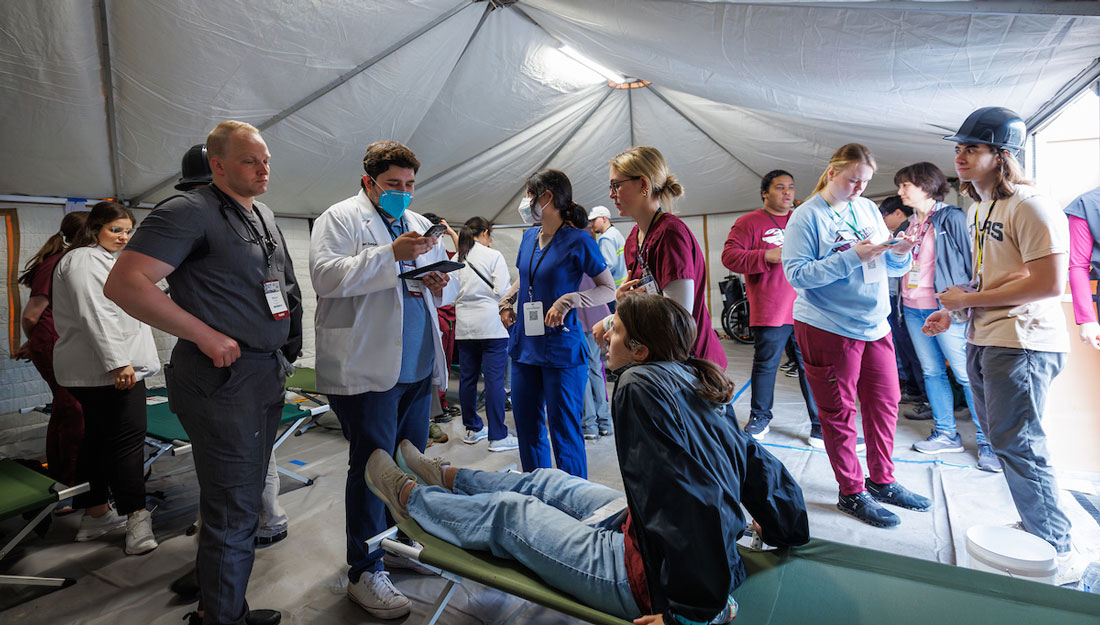- Ann Kellett, PhD
- Public Health, Research, Show on VR homepage
Customized smartphone app shows promise in preventing further cognitive decline among older adults diagnosed with mild impairment
App offers cognitive and physical activities that users can adjust to their needs and feedback via AI-generated conversations

Personalizable smartphone apps show great promise for older adults with mild cognitive decline. (Adobe Stock)
A growing body of research indicates that older adults in assisted living facilities can delay or even prevent cognitive decline through interventions that combine multiple activities, such as improving diet, solving puzzles and increasing social interactions.
Multidomain interventions, including games and exercises delivered through smartphone-based apps, have also proven effective in slowing cognitive decline in this population.
One such intervention is the Silvia Program, a free, cognitive health care lifestyle app that offers one-on-one coaching from a clinical psychologist, cognitive exercises and activities, personalized routine suggestions and a voice analysis tool that can detect symptoms of dementia.
Until now, however, the Silvia Program’s impact on cognitive decline in older adults with mild cognitive impairment had not been widely studied.
To explore the issue, researchers Junhyoung “Paul” Kim, PhD, and Marcia Ory, PhD, from the Texas A&M University School of Public Health, Yongseop Kim, PhD, from the University of Utah, and two representatives from Silvia Health, Inc., pilot tested the Silvia Program with residents at an assisted living facility in Indiana.
Their study was published recently in Public Health and Practice.
“We evaluated the Silvia Program’s overall efficacy on the cognitive functioning of these residents, while also examining whether age or gender influenced the outcomes,” Kim said. “This is significant, as many assisted living facility residents face challenges such as social isolation and limited access to health care, which can exacerbate cognitive decline. Tools like the Silvia Program could offer valuable support.”
The researchers recruited 20 residents experiencing mild cognitive impairment and conducted a randomized clinical trial with 10 participants receiving the Silvia intervention and 10 in a control group that had no interventions.
The average participant age was 78 years, and the male-to-female ratios were similar. Educational levels differed, however, with seven control group participants and three intervention group participants reporting less than a high school education or only a high school education.
The Silvia Program intervention included daily goal setting, cognitive training through 15 personalized programs and monitoring of nutrition, activity and sleep patterns. It also featured a home-based aerobic and resistance exercise program with visual step-by-step guides. Cognitive training sessions were held three times a week, lasting 15 to 30 minutes each, for 12 weeks. Physical exercises were conducted twice a week, with each session lasting 30 minutes. Meanwhile, the control group maintained their usual routines without using the app.
“Participants in the Silvia Program also engaged in individualized, AI-generated conversations about their activities, including the difficulty of tasks, time spent and cognitive exercise scores,” Kim explained.
While initial cognitive assessments showed no significant difference in the baseline scores between the two groups, the Montreal Cognitive Assessment and other statistical analyses revealed that the Silvia group showed significant improvement (p = 0.04) while the control group showed a nonsignificant decline (p = 0.49).
The intervention group also exhibited improvements in visuospatial/executive function (the ability to successfully complete a task), language, delayed recall and orientation scores. Their attention scores decreased, however, and naming and abstraction scores remained unchanged.
The control group displayed nonsignificant increases in visuospatial/executive function, naming and abstraction scores, with declines in language and delayed recall scores and no changes in attention and orientation scores.
“Our study demonstrates that customized, mobile multidomain programs can benefit older adults experiencing mild cognitive decline,” Kim said. “The potential for even greater outcomes as these programs are further refined and expanded is immense.”
Media contact: media@tamu.edu


